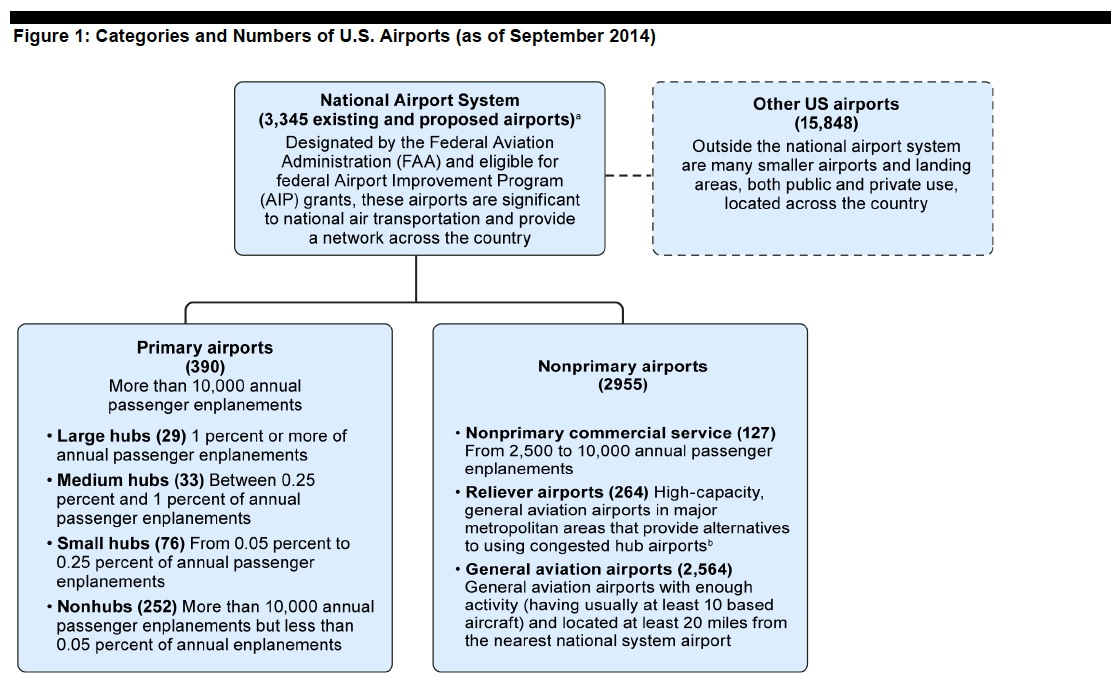UNITED STATES GOVERNMENT ACCOUNTABILITY OFFICE
What GAO Found
From 2009 through 2013, national system airports had available an average of $10 billion annually for capital development from the following funding sources:
• airport-generated net income ($3.8 billion),
• federal Airport Improvement Program (AIP) grants ($3.3 billion),
• local passenger facility charges (PFC) ($1.8 billion),
• airport sponsor or owner capital contributions ($644 million), and
• state grants ($477 million).
Larger airports (large and medium hubs) obtained more than half of their capital development funding from airport-generated net income, while smaller airports (small and non hubs and general aviation airports) relied on AIP grants for 69 percent of their funding.
Airports’ planned capital development costs for fiscal years 2015 through 2019 are estimated at $13 billion annually (in 2013 dollars). Larger airports account for 65 percent of the planned development. For AIP-eligible projects, the largest shares of planned development costs are for projects to reconstruct facilities ($2.2 billion), meet the Federal Aviation Administration’s (FAA) airport design standards ($2.1 billion), and enhance airfield capacity ($977 million).
Airports’ planned capital development exceeds past funding levels, but airports have some options in how they choose to fund capital projects. GAO adjusted past funding amounts to 2013 dollars to make them comparable with planned development costs. This inflation-adjusted amount of funding—$10.3 billion per year—would still fall short of the $13 billion in planned capital development costs by $2.7 billion per year. Airports have several options for trying to align capital funding and the costs of planned development, including prioritizing projects, increasing airport-generated net income, and borrowing money to fund capital projects. Borrowing is generally accomplished by issuing bonds; bonds entail leveraging future funding to pay for projects. Two airport financial consulting firms with whom GAO spoke noted that some airports are already highly leveraged. Consistent with this, analysis of data from PFC applications for projects with start dates from 2009 through 2013 indicates that airports plan to spend 74 percent of their PFC revenues on debt service—38 percent on principal payments and 36 percent on interest payments. Nonetheless, three bond rating agencies that GAO spoke with continued to give airports high or stable ratings and one stated that access to capital markets for larger airports remains strong.
Federal funding for national system airports involves policy decisions, such as choices about the overall amount of AIP grant funding to make available annually, which airports should be included in the national system and thus be eligible for AIP grants, the maximum allowable PFC, and how, if at all, AIP and PFCs should be interrelated. The President’s fiscal year 2016 budget proposal includes some possible changes to AIP and PFCs. The proposal seeks to lower the overall amount of AIP funding to $2.9 billion, but simultaneously increase the maximum allowable PFC. Specific provisions in the proposal would operate to increase AIP funding for small airports and decrease AIP funding for larger airports, presuming that larger airports would generally opt for higher PFCs and that doing so would offset, or more than offset, their AIP decreases.
About the United States Government Accountability Office
www.gao.gov
The U.S. Government Accountability Office (GAO) is an independent, nonpartisan agency that works for Congress. Often called the “congressional watchdog,” GAO investigates how the federal government spends taxpayer dollars. The head of GAO, the Comptroller General of the United States, is appointed to a 15-year term by the President from a slate of candidates Congress proposes. Gene L. Dodaro became the eighth Comptroller General of the United States and head of the U.S. Government Accountability Office (GAO) on December 22, 2010, when he was confirmed by the United States Senate. He was nominated by President Obama in September of 2010 from a list of candidates selected by a bipartisan, bicameral congressional commission. He had been serving as Acting Comptroller General since March of 2008.
Tags: airports, U.S. GAO, United States Government Accountability Office







 RSS Feed
RSS Feed